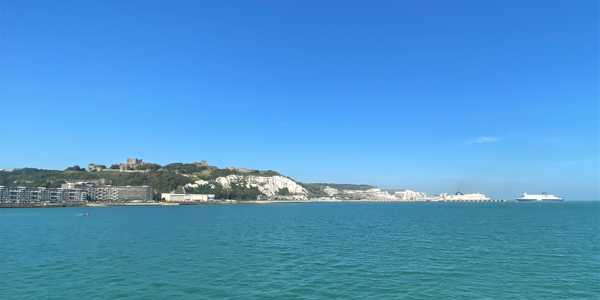
Sampling
Legislation requires certain consignments to be subject to sampling, and…
Read more about SamplingHigh Risk Food Not of Animal Origin (HRFNAO) that originates from a Rest of World country (RoW) and transits through the EU are subject to controls.
The BCP at Dover Port is approved for all fresh products of non-animal origin (sometimes referred to as high risk food not of animal origin – HRFNAO) which are not subject to temperature control, as listed in Annex I and II of assimilated Commission Implementing Regulation (EU) 2019/1793 as amended by SI No. 2024 No.120 (from 7th March 2024).
Please note: Dover is not approved to handle chilled or frozen high-risk food, any high-risk feed or products of animal origin.
The list of high risk foodstuffs with current restrictions can be found here Foodstuffs with GB import restrictions | Food Standards Agency.
High Risk Food Not of Animal Origin – Rest of World (RoW)
Annex I and Annex II
Annex I
Annex II
All HRFNAO consignments that are consigned from the EU will be subject to border checks as outlined in Regulation 2019/1793.
Any HRFNAO consigned from the EU must be pre-notified on IPAFFS and a CHED-D raised. The importer must select the true country of origin (ROW) and state the EU country it has been consigned from. EU consigned HRFNAO must enter though an approved BCP.
However please note If your HRFNAO has been imported to the EU and then processed, it is no longer considered high risk.
Please read the attached guidance on the government website where these rules are laid out. Import high-risk food and feed not of animal origin from the EU to Great Britain - GOV.UK (www.gov.uk)
Health certificate and Laboratory reports
In addition to completing the CHEDD in IPAFFS you will need a laboratory report and a health certificate (also called an ‘official certificate’) if you import the following HRFNAO:
The model health certificates can be found on the following website: High risk food and feed not of animal origin (HRFNAO): model health certificates – GOV.UK (www.gov.uk)
Please ensure you use the correct model for the product being exported to GB.
Health certificates
The EU exporter must:
This means that, for example, Dried Figs from Turkey that have been stored in The Netherlands before being shipped to GB must be accompanied by an EHC issued by the competent authority in The Netherlands. The health certificate used to import the goods into the EU is not acceptable.
Laboratory reports
Laboratory analyses must cover the contaminant(s) specified as an issue for that product. Laboratory analyses must be dated no more than 6 months before the date of issue of the health certificate.
The Food Standards Agency (FSA) have advised us of the following:
Rice and Rice products from China
Please note: rice and rice products controlled by assimilated Decision 2011/884/EU that have been imported into the EU and stored before being shipped to GB will not be permitted.
The FSA have advised that this is because assimilated Decision 2011/884 does not have anything to allow consigning countries to complete the paperwork. Article 4 requires that the consignments are accompanied by an analytical report and a certificate, which are completed, signed, and verified by an authorised representative of the ‘Entry Exit
Inspection and Quarantine Bureau of the People’s Republic of China’ (AQSIQ). If the consignments come with the EU certificate, we would advise that it is non-compliant and could be rejected due to a documentary failure.
All HRFNAO that comes from Rest of the world countries and also EU consigned consignments will require a CHED D raised with Part 1 completed on the Import of products, animals, food and feed system (IPAFFS) Import of products, animals, food and feed system (IPAFFS) - GOV.UK (www.gov.uk)
We will then need to be pre notified of this via email at least one working day ahead of arrival, if this is not met then a Late notification fee will apply. (Working hours Monday-Friday 09.00-17:00 hours)
Supporting documentation must be attached to the CHED D on IPAFFS or via e-mailed when you notify.
CHED-D – Importers will be required to pre-notify the Port Health Authority at least 1 working day ahead of arrival. This is done by creating a CHED-D on IPAFFS (Import of Products, Animals, Food and Feed Service).
Invoice – The invoice will cover the sale of goods and usually shows the consignment’s intended destination.
Packing list – Packing list will list each commodity in the consignment and list the gross and net weights.
Transport Document – (CMR or Seaway Bill) - Will provide evidence of the consignment’s journey and intended destination.
Model Official certificate – Each consignment of HRFNAO (High Risk Food of Non-Animal Origin) listed in Annex II must be accompanied by a model official certificate. A model official certificate is an official document that confirms your export meets the health requirements of GB (Great Britain) and is verified by a competent authority. This is not required if your product is on Annex I.
Results of sampling and analysis - Each consignment of food listed in Annex II shall be accompanied by the results of sampling and analysis performed on that consignment by the competent authorities of the third country of origin, or of the country where the consignment is consigned from if that country is different from the country of origin. This is not required if your product is on Annex I.
Importers of relevant consignments are required to pre-notify the Port Health Authority at least one working day prior to the goods’ arrival. This must be done by submitting a CHED-D (Common Health Entry Document for Products of Non-Animal Origin) via the IPAFFS system.
Upon arrival at the Port of Dover, the importer—or an authorised agent acting on their behalf—must ensure that the consignment is accompanied by the original supporting documents, including:
Proof that these original documents accompany the consignment must be submitted to Dover Port Health Authority via email at porthealth@dover.gov.uk before the vehicle departs from Dover.
For consignments subject to Annex II controls, the original documents must be physically presented upon arrival at the following address:
Dover District Council
White Cliffs Business Park
Dover
Kent
CT16 3PJ
Following satisfactory checks, a Port Health Officer will complete, stamp, and sign Part II of the CHED-D, authorising the goods to proceed to their final destination.
Failure to present or have the required documents endorsed prior to departure from Dover will result in the consignment being deemed non-compliant. In such cases, the consignment will be referred to the inland authority at the place of destination for further action.
onsignments listed under Annex I and Annex II may be subject to identity and physical checks, including sampling, by Dover Port Health Authority.
When a CHED-D is submitted via IPAFFS, the importer or agent will be notified if the consignment has been selected for such checks.
If selected, it is strongly recommended that the vehicle makes use of the Motis Dover parking facilities while checks are pending. Please note:
Once identity and physical checks are completed, the cargo terminal will be informed, and the driver will be notified that the consignment may proceed to its destination.
However, if the consignment is selected for sampling, the entire quantity of the selected product must remain at the cargo terminal until laboratory results are received, unless alternative arrangements have been agreed with Port Health in advance.
Samples will be dispatched to the laboratory as soon as possible. The importer or agent will be notified once results are available.
A list of UK BCPs for animal and animal products can be found here UK border control posts: animal and animal product imports - GOV.UK (www.gov.uk)
Fees are payable for documentation, identification, and/or physical examination as applicable. Additional costs would be incurred through analyst sample testing fees and courier fees.
Our current fees and charges can be found on our Port Health charges page (please see the link at the bottom of this page).
Please email porthealth@dover.gov.uk to set up a payment account prior to the arrival of an Import.

Legislation requires certain consignments to be subject to sampling, and…
Read more about Sampling
The port health and food safety charges for 2025/26 are outlined below. …
Read more about Port Health Charges
Importers (or agents on their behalf) are required to notify Dover Port …
Read more about Pre-Notification